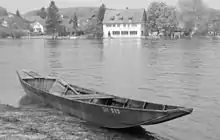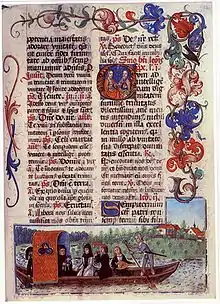Weidling (boat)
A Weidling is a flat-bottomed boat, with similarities to a punt. The weidling is traditionally constructed from solid wood, although today some boats are also made from plywood, plastic or aluminium. It is usually around 9 or 10 metres (30 or 33 ft) in length. A larger version is known as the Langschiff, and is up to 15 metres (49 ft) in length.[1][2]

In the Middle Ages, the weidling was used for river transportation and fishing, and is depicted in contemporary works of art, including a set of altar panels by Hans Leu the Elder.[1][2]
_-_rechtes_Limmatufer_-_Limmatquai_(Wasserkirche)_mit_Weidling_2013-04-08_15-20-30.jpg.webp)

Today, the boat is primarily used in Switzerland, on the Rhine and its tributaries, including the Aar and Limmat. It is used as a leisure and pleasure craft, and as a passenger ferry. The sport of Wasserfahren in Switzerland is conducted almost exclusively with weidlings.[1][2]
In deep water, the weidling is traditionally propelled by one or two oars. In shallow areas, the boat can be poled along by one or two standing crew members. On waterways with suitable banks, the weidling can also be towed from shore. If the boat has a corresponding recess in the rear floor, it can also be equipped with an outboard motor.[1]
References
- "Clubportrait Schiffe" (in German). Limmat-Club Zürich. Retrieved 2013-04-24.
- "Weidlingsfahren". Swiss Confederation - Federal Office of Culture. Retrieved 2013-04-25.
External links
 Media related to Weidling at Wikimedia Commons
Media related to Weidling at Wikimedia Commons